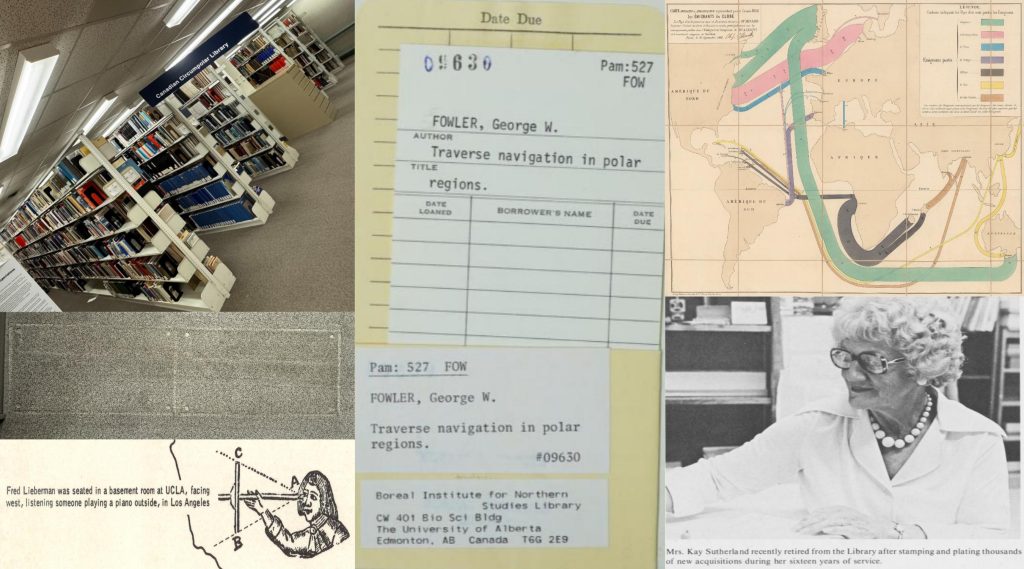- Important change to Canadian Standards Association (CSA) user interface
This is for awareness, particularly for everybody who fields questions about databases from students and faculty. The CSU team doesn’t always send out alerts when database interfaces change, but in this case, there’s a real possibility that changes may spark confusion and frustration. Please share this info, add to FAQs, etc., as you see fit.
At UAL, we subscribe to the CSA OnDemand Complete Collection. This is an important standards database. The Canadian Standards Association (CSA) recently made changes that mean it’s now extremely easy for our patrons to trigger a security message telling them, “Sorry, you have been blocked,” even though they haven’t done anything wrong (and they aren’t really blocked). Fortunately there’s a way to avoid this situation, even though CSA’s interface doesn’t make it obvious.
If patrons interact with the CSA Catalogue, they will trigger the security message. If patrons interact with the CSA Document Library, they will access the CSA collection via our subscription, as normal. Here is a screenshot with the relevant areas marked.

Image: screenshot of the CSA database, with sections that will trigger a security message marked, ie. anywhere patrons may interact with the Catalogue. Using the Document Library will not trigger a security message. The CSU team has explained to CSA that this new arrangement is detrimental to students and researchers. We will continue to follow up with them on this. We hope this info will help you trouble-shoot on the spot, for anyone who thinks they’ve been blocked.
- Edmonton Heritage Council Digital Resources Web Archive
Archived since September 2025
The Web Archiving Team invites you to explore the new Edmonton Heritage Council Digital Resources Web Archive! We’ve partnered with the Edmonton Heritage Council (EHC) to create an archive of the online EHC exhibits. This new collection will continue to grow as new EHC online exhibits are created.
The Edmonton Heritage Council (EHC) Digital Resources Web Archive aims to capture and preserve digital resources created by or funded by the EHC. This new archive includes community-created resources that were funded by the Heritage Community Investment Program (HCIP) or the Funding Indigenous Resurgence in Edmonton (FIRE) grant streams from EHC. Such projects focus on local heritage in Edmonton and on Treaty 6, and include important information on historic places, cultural communities, people, and language preservation, as well as organizational websites. Archived content includes the EHC website, the Edmonton City as Museum Project (ECAMP), Edmonton Maps Heritage, and Capital Modern. Beginning in 2025, most content has been crawled on a quarterly basis. All content was produced and made available online by the Edmonton Heritage Council. Where available, current web content can be found on the attributed websites or related successor websites.


- Empowering Edmonton’s Heritage through inclusive Grant Programs. https://wayback.archive-it.org/30628/20251107160107/https://edmontonheritage.ca/
- Our Initiatives. https://wayback.archive-it.org/30628/20251107160107/https://edmontonheritage.ca/
For questions, site suggestions, or referrals, contact the Web Archiving Team at webarch@ualberta.ca
- Access to the New York Times
As you may recall, last year, the CSU team decided to discontinue the UAL subscription that provided unlimited access to NYTimes.com via browser or app. In effect, this change returns New York Times access options to their pre-pandemic state (as we only added the app-focused NYTimes.com subscription in 2019).
The collection still contains numerous ways of accessing the New York Times, including up-to-date access to multiple editions, as well as archival access back to the paper’s founding in 1851.
HELPFUL LINKS
Here are some links that may come in handy:
Noelle Fraser and Doris Wagner maintain the Newspapers LibGuide, including a page dedicated to clarifying New York Times options! Thanks, Noelle and Doris! https://guides.library.ualberta.ca/newspapers/New-York-Times
Our new Primo search system, with its FRBR-ization capacity, makes it quite a lot easier to search for the New York Times: https://search.library.ualberta.ca/permalink/01UOA_INST/cgo409/alma991043577449909116
DATABASE A-Z LIST ASSET UPDATES
The NYTimes.com asset and the related NYTimes inEDUCATION asset have been updated to communicate the cessation of this subscription. In a short while we will delete these assets altogether. Thanks to Lisa Maraj for taking care of these updates!
In the course of tidying up these assets, CSU also decided to delete the asset called “New York Times (1980-current).” This one largely duplicated the US Major Dailies database asset.
- The University of Alberta Student Life Web Archive
Archived since September 2025
The Web Archiving Team invites you to view the new U of A Student Life Web Archive! This collection includes websites created by registered undergraduate and graduate student groups, including student councils, associations, and clubs.
Check out student-run websites for: nonprofit and charitable organizations like Student Legal Services, research projects like the Great Northern Concrete Toboggan Race Team, academic associations like the Undergraduate Association of Computing Science, social and cultural groups like the Black Students’ Association, and activity-based groups like the Hide and Seek Club. This collection helps preserve evidence of the wide variety of students’ activities and experiences at the U of A.
If you have questions, website suggestions, or referrals, contact the Web Archiving Team at webarch@ualberta.ca.



- The History of GNCTR. https://wayback.archive-it.org/30094/20250923210026/https://ualbertagnctr.squarespace.com/competition-history
- Student Legal Services. https://wayback.archive-it.org/30094/20250923211223/http://www.slsedmonton.com/
- UABSA Our Team. https://wayback.archive-it.org/30094/20250923205552/https://uabsa.ca/team
- Collections and their Footprints
October 15th, 2025 was the 60 year anniversary of A fluxatlas : Spatial Poem, by Mieko Shiomi. To construct the map, Mieko Shiomi contacted people around the world (many who were part of “Fluxus” an international community of artists) asking individuals to record what they were doing & the direction they were facing the morning of Oct 15, 1965. Wanting to celebrate, I walked out of the map room on the 4th floor of Cameron library, rotated South-East, and snapped a picture of the Canadian Circumpolar Collection,1 while in ponderance of the impending move.
I have always been fascinated by the physical footprint of collections. The strong steady appearance of steely shelves and their voluminous heft suggest a confiuration that has always been. Yet, collection stances are tenuous. Continually moving, interfiling, weeding, and eventually shifted to that ”locker in the transom” offsite storage.2
Except for library/collection names, addresses on old checkout slip pockets, and stamps and/or bookplates in the physical monographs there is no easy way to reconstruct past institutional collection locations. When a collection is disassembled its location code is overwritten. In other cases, especially if the items were acquired as a donation, a local note is added to the record. A recent example, the materials from the Faculty of Native Studies Strynadka/Brady Reading Room.
While I am sure there are technical/labour intensive reasons for the deletion of former location codes, their expunging seems detrimental to future researchers. Imagine a Minard-like flow diagram (a spatial mono-cem-trail) from building to building with arrows showing the direction of collection moves and a line thickness related to the volume of materials.
With this in mind, a shelflist snap-shot was taken of the Canadian Circumpolar Collection a few weeks ago, capturing the collection’s last stance. This spreadsheet scaffolding will provide future researchers with a path to investigate the collection.3 A simple example, sorting by Library of Congress call numbers (thematic, geographic and a gutter of cutters) as a way to reconstruct clusters of related materials. Or the possibilities of scripting crosswalks that shift Library of Congress call numbers to other classifications schemes like the Brian Deer Classification System (BDCS), or the Scott Polar Research Institute’s Universal Decimal Classification system that was adapted for polar libraries. Going forward, one can hope that shelf list snap-shots are done for other physical collections on the cusp of moving and melding as libraries substitute physical holdings for ongoing student study/social space and internal and external staff office space.
All of this makes me appreciate the digitization of the Circumpolar Pamphlets Collection (a variety of government, institutional and Indigenous community reports) that now reside on the Internet Archive as its own unique collection. Not only do these 3000 items have enormous research value, they are now virtually locked and located together including notes that the material was originally part of the Boreal Institute for Northern Studies Library (1960s – 1980s), before the name change in the 1990s to the Canadian Circumpolar Institute when the collection was transferred to the University of Alberta Library. Just last week the pamphlets and their vertical containers left Cameron Library. All that remains are the imprints on the carpet.

Figure 1. Images noted in the article.